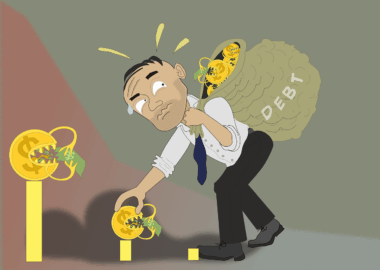The Challenges of Debt Repayment During High Inflation Periods
Debt repayment can be particularly challenging during periods of high inflation. Generally, inflation erodes purchasing power, making it more difficult for individuals to meet their monthly obligations. This effect can create a precarious situation wherein borrowers find it hard to keep up with loan payments while dealing with rising costs for essential goods and services. Inflation can increase interest rates as lenders attempt to adjust to the diminished value of currency. Higher interest rates translate to steeper payments on existing debts, thereby intensifying financial stress. Borrowers may start to feel trapped, as their wages may not adequately keep pace with inflation, leading them to prioritize other necessities over debt obligations. This scenario raises serious financial concerns and can ultimately worsen an individual’s credit rating. As the economy suffers, the pressure mounts, and borrowers may find themselves falling deeper into a cycle of debt. Adaptations in spending habits become critical, as individuals must reevaluate budgets to accommodate a broader range of expenses caused by inflationary pressures. Thus, a proactive approach to managing debt becomes vital for those affected.
Understanding Inflation’s Role in Debt Management
Individuals seeking to understand the impact of inflation on their debt management should consider several key factors influencing this complex relationship. First, inflation leads to rising prices, which subsequently diminishes disposable income. In such conditions, allocating funds toward creditors becomes increasingly burdensome. Second, fixed-rate loans may initially seem advantageous; however, inflation can lead to a reassessment of priorities, forcing borrowers to divert funds for necessities rather than for paying down debts. As a result, individuals may find themselves unable to maintain earlier repayment schedules. Third, inflation can also affect borrower creditworthiness. Creditors closely monitor inflation trends; if they anticipate continued inflation, they may either tighten lending standards or increase interest rates, further complicating debt management. Fourth, borrowers should consider alternatives, such as refinancing options, which may provide temporary relief from high-interest payments. Yet, eligibility for such solutions can be undermined by a poor credit rating worsened by inflation-related stresses. Therefore, developing a comprehensive understanding of how inflation influences debt is essential for effective financial management in these challenging environments.
Strategies to manage debt during high inflation periods might include practical adjustments to one’s budgeting. Maintaining a realistic budget becomes even more essential when inflation occurs unexpectedly. First, individuals should prioritize their debts by considering interest rates and payment due dates, focusing on high-interest accounts to minimize overall costs. Second, cutting back on non-essential expenses may provide room for making larger payments on debts, thus keeping financial health more stable. Third, if possible, individuals can opt for side hustles or additional income streams to increase their cash flow. This can potentially lessen the impact of inflation on monthly obligations. Fourth, seeking professional financial advice could be invaluable. A financial advisor can offer insights into managing debts effectively while navigating inflation. They can help create an individualized debt repayment plan that considers current economic conditions. Lastly, maintaining open communication with creditors can lead to possible arrangements that relieve financial strain. By implementing these strategies, borrowers can take proactive steps to address their debt concerns without becoming overwhelmed by the challenges inflation brings.
Long-Term Considerations in Inflationary Environments
When considering the long-term impacts of inflation on debt repayment, it becomes evident that awareness and adaptability are paramount. As inflation persists, individuals must remain vigilant in monitoring economic trends that may signal shifts in interest rates, and subsequently, their debt obligations. One long-term consideration involves the feasibility of fixed versus variable interest loans. Fixed loans can benefit borrowers when inflation rises; however, they may also miss out on potential lower rates offered in the market under different economic conditions. Maintaining diversification within investments could also offer a hedge against inflation while providing opportunities for growth, potentially leading to increased financial fluidity. Additionally, individuals should keep a close watch on changes in government policies that may affect inflation indirectly. Regulation changes can have sweeping effects on the economy, impacting employment stability and wage growth or reductions. Planning for potential scenarios can aid borrowers significantly by offering a clearer path toward debt repayment in various economic climates. Therefore, understanding these long-term considerations can significantly influence how effectively one manages debt during challenging inflation periods.
One often overlooked aspect of debt management in high inflation conditions is the emotional toll it takes on borrowers. Rising costs paired with stagnant incomes lead to increased anxiety and stress, negatively impacting mental health. Financial stress can result in sleepless nights, reduced productivity, and deteriorating relationships. This situation can create a vicious cycle, as stress may lead to poor financial decision-making. Tremendous pressure can cause individuals to withdraw socially or seek support from unhealthy coping mechanisms, such as accumulating more debt. Recognizing these emotional consequences is crucial for creating a holistic approach towards debt management during inflationary periods. Incorporating practices such as mindfulness or engaging in community support groups can aid in addressing the psychological aspects of managing debt. Prioritizing mental health during financial struggles ensures individuals are better equipped to make rational decisions about their finances. Seeking counseling or financial therapy can also help individuals address the underlying emotions tied to debt, ultimately leading to healthier financial habits. Recognizing the interplay between mental well-being and debt management will always be an essential component of navigating these tumultuous economic times.
The Importance of Financial Education
The significance of financial education cannot be overemphasized, particularly during periods marked by high inflation. Knowledge and awareness play pivotal roles in allowing individuals to navigate complex debt situations. By equipping themselves with a fundamental understanding of how inflation impacts the economy and their personal finances, individuals can better prepare for unexpected economic changes. First, financial literacy helps in recognizing how borrowing costs can escalate during inflationary periods. As interest rates rise in response to inflation, consumers with a well-rounded understanding of financial principles can make informed decisions about handling their debts. Second, being financial savvy enables borrowers to identify optimal times for refinancing or renegotiating loan terms. Understanding the nuances of credit scores and debt-to-income ratios becomes essential for borrowing efficiency. Furthermore, financial education empowers individuals to adopt budgeting techniques tailored to their unique situations, ensuring they can monitor expenses and prioritize payments effectively. Additionally, it encourages proactive engagement in discussions about debt management with family and peers. Providing access to vital financial information allows borrowers to cultivate more sustainable financial behaviors, which ultimately foster resilience against inflationary challenges.
In conclusion, addressing the impact of inflation on debt repayment requires a multifaceted approach. Borrowers must not only understand the dynamics of inflation playing out in the economy but also actively implement strategies that minimize its effects on their financial well-being. Maintaining awareness of current economic trends and making informed choices can significantly alleviate stress during challenging periods. Additionally, recognizing the importance of emotional well-being in financial management serves to create a more comprehensive, proactive strategy for dealing with debt. The significance of financial education cannot be understated; equipping oneself with knowledge about managing debt under inflationary pressures ultimately leads to better decision-making. Alongside practical strategies such as prioritizing debts and cutting non-essentials, seeking out professional advice and support systems can fortify one’s ability to navigate these challenges. A combined effort involving personal initiative and community support contributes positively to debt management. By adopting effective practices and fostering financial literacy, individuals can enhance their resilience in the face of ongoing inflation. Ultimately, facing the challenges of debt repayment during high inflation periods head-on enables the fostering of healthier financial futures.
This is another paragraph with exactly 190 words…





